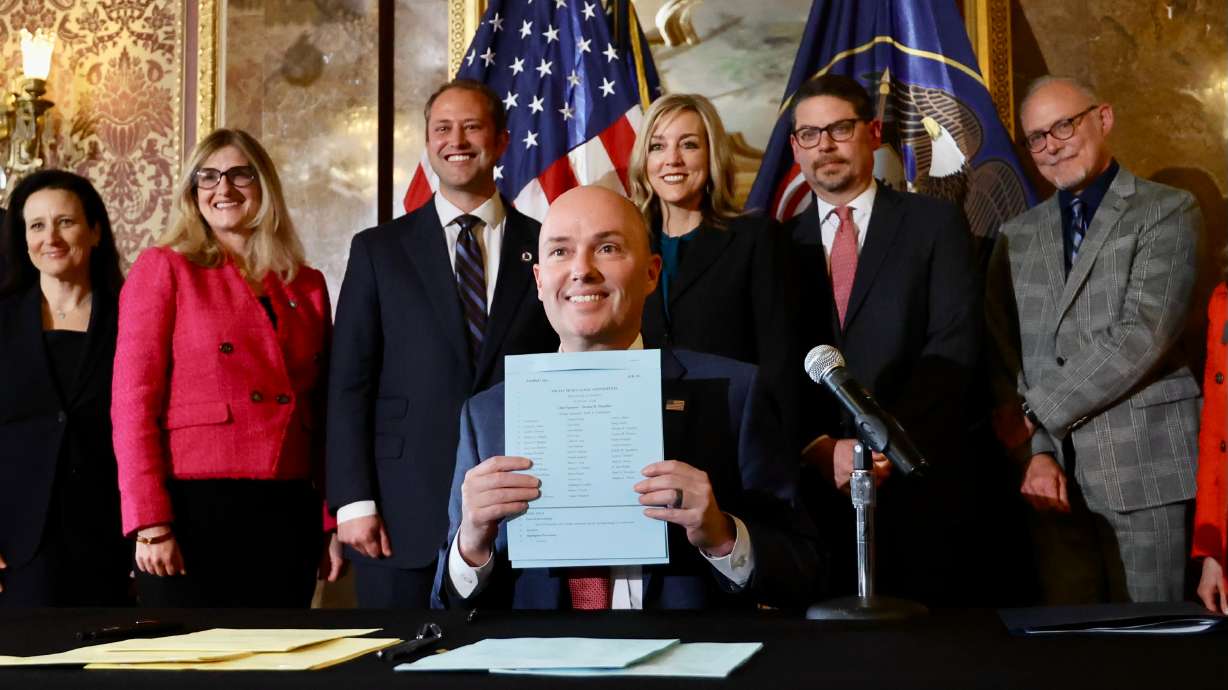Estimated read time: 5-6 minutes
This archived news story is available only for your personal, non-commercial use. Information in the story may be outdated or superseded by additional information. Reading or replaying the story in its archived form does not constitute a republication of the story.
SALT LAKE CITY — The showdown between big tech companies and the state of Utah has officially begun, as Gov. Spencer Cox signed the nation's first major social media regulations into law on Thursday.
Passed by the Legislature earlier this month, SB152 and HB311 are touted by lawmakers as necessary to counter the alleged harms social media platforms enact on teenagers. But the bills have drawn strong pushback from industry groups and have raised concerns about freedom of speech and privacy.
Cox and legislative leaders have pointed to a recent Centers for Disease Control and Prevention report showing that 57% of teen girls persistently felt sad or hopeless in 2021, and nearly 1 in 3 considered suicide.
"I'm so proud of the great work that you all were able to accomplish together with your colleagues in the Legislature," Cox told lawmakers during a ceremonial signing of the bills Thursday. "These are first-of-their-kind bills in the United States, and that's huge that Utah is leading out on this effort."
SB152, sponsored by Cox's brother-in-law, Sen. Mike McKell, R-Spanish Fork, requires that minors get parental consent before signing up for social media, beginning March 1, 2024. In order to prevent minors from creating accounts without their parents' approval, it requires companies to verify the ages of all users in Utah.
The bill specifies that platforms cannot rely solely on government-issued IDs to verify age, and it remains unclear how companies will be required to do that.
McKell said lawmakers have had a strong partnership with advocates in crafting the bill "because it's our kids and we care. And there is a really, really big problem out there."
"I think this is the first step," he continued. "I'm really optimistic with what I've seen. ... We are going to make a difference, and it's going to start here in Utah."
SB152 also requires companies to treat minor accounts differently than adult accounts by limiting their appearance in search results, disabling direct messaging with certain accounts, preventing the collection of minors' data, prohibiting targeted advertising toward minors, and enabling parental controls for their children's accounts.
"We believe that these bills are not the solution in and of themselves," said Rep. Jordan Teuscher, R-South Jordan. "These are tools to help parents and that's why we ran these bills."
Teuscher is the sponsor of HB311, which creates a private right of action for individuals to sue over alleged harms to teens and adds a legal presumption that social media is harmful to teens. Companies will now have the burden of proof to demonstrate that their products are not harmful to teens.
HB311 also prohibits algorithms or other features that a company knows to cause a minor to become addicted to social media.
Most major social media companies have not taken a public stance on the bills. A spokesperson for Meta, the parent company of Facebook and Instagram, told KSL.com the company has developed dozens of safety tools for its products.
"We want teens to be safe online," the Meta spokesperson said in a statement provided to KSL.com. "We've developed more than 30 tools to support teens and families, including tools that let parents and teens work together to limit the amount of time teens spend on Instagram, and age verification technology that helps teens have age-appropriate experiences. We automatically set teens' accounts to private when they join Instagram, and we send notifications encouraging them to take regular breaks. We don't allow content that promotes suicide, self-harm or eating disorders, and of the content we remove or take action on, we identify over 99% of it before it's reported to us."
"We'll continue to work closely with experts, policymakers and parents on these important issues," the statement continued.
NetChoice, a tech industry trade association, called the bills unconstitutional. In a news release, the group argued they violate the First Amendment by banning anonymous speech online and by infringing on adults' lawful access to constitutionally protected speech.
"Utah will soon require online services to collect sensitive information about teens and families, not only to verify ages but to verify parental relationships ... putting their private data at risk of breach," said Nicole Saad Bembridge, the associate director of the NetChoice Litigation Center. "If people don't have or are unwilling to submit the required documentation, they would lose access to critical information channels."
The Association of National Advertisers also said the bills violate First Amendment rights by denying minors access to advertisements and businesses to share messages.
"In doing so, the law limits the ability of older teens to get important information they need," including information about colleges, job opportunities and other resources, said Chris Oswald, executive vice president of the association. "As other legislators look at these issues, we encourage them to consider more nuanced standards that recognize the difference between a 7-year-old and a 17-year-old, so we can protect younger children without denying older teens access to the wealth of ad-based content and information available to them online."
Between now and March 1, 2024 — when the bills go into effect — the Utah Division of Consumer Protection will set up a system for age verification. The division will also receive $280,000 in one-time funds and $220,000 in ongoing funds to investigate and enforce violations of the law.










